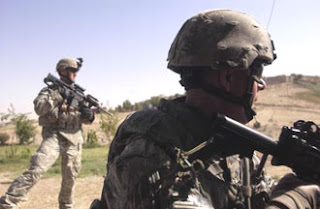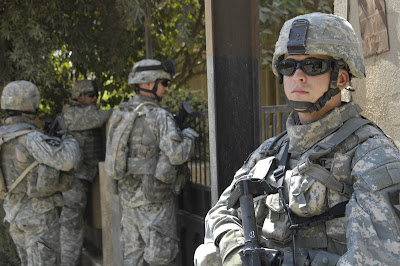Wednesday, October 10, 2007
"Iraq Deaths at Yearly Low"
http://www.time.com/time/world/article/0,8599,1667013,00.html
"Civilian killings in Iraq plunge in September"
http://news.yahoo.com/s/nm/20071001/ts_nm/iraq_civilians_dc
Major Evening News Networks - "Good News from Iraq"
Seems the Surge is working.
Violent incidents down; Al Qaeda ‘off balance’ in Iraq
 U.S. Army Pfc. Joshua Smith and Sgt. Trent Boone, both of Alpha Troop, 27th Cavalry Regiment, 4th Brigade Combat Team, provide security during a good neighbor mission in Mosul
U.S. Army Pfc. Joshua Smith and Sgt. Trent Boone, both of Alpha Troop, 27th Cavalry Regiment, 4th Brigade Combat Team, provide security during a good neighbor mission in Mosul“In a whole sense there is no question about the fact that, in our minds, the trend is going in the right direction,” said Navy Rear Adm. Mark I. Fox, communications division chief for Multi National Force-Iraq.
“Our efforts to continue the reduction in violence will allow Iraqi society to begin to mend. There is a lot of hard work to do.”
Hard work means stopping extremists before they strike, Fox said in a news briefing. To that end, he said, Iraqis are reporting insurgent activity in their neighborhoods.
Monday, October 1, 2007
Air Cavarly Kills 20 Al Qaeda
Patrolling the skies, aircraft from the 1st Air Cavalry Brigade, 1st Cavalry Division had reported to the scene to observe possible extremist activities in the area based off of a report from local Iraqi Security Volunteers that an Al Qaeda cell was working in the area.
Upon arriving to the scene, the aircraft observed about 25 Al Qaeda personnel carrying AK-47 assault rifles, with one of the men brandishing an RPG, and walking through an area of local shops and into a palm grove. Shortly after spotting the men, the aircraft were fired upon by the insurgent fighters.
The incident took place within the 1st “Ironhorse” Brigade Combat Team, 1st Cavalry Division’s area of operations where Ironhorse troops from the 2nd “Stallion” Battalion, 8th Cavalry Regiment have been working alongside the Iraqi Security Volunteers and Iraqi Security Forces to root out Al Qaeda operatives and extremists.
No Iraqi Security Volunteers or U.S. Soldiers were hurt or killed during the engagement.
‘Dragon’ Offensives Destroy al Qaeda Outposts in Dora
 U.S. Army Pvt. Joseph M. Dement (right) provides security in the city of Dora in Southern Baghdad, Iraq, on Sept. 20, 2007.
U.S. Army Pvt. Joseph M. Dement (right) provides security in the city of Dora in Southern Baghdad, Iraq, on Sept. 20, 2007. Coalition offensives in southern Baghdad, spurred by Iraqi intelligence, have dramatically reduced al Qaeda-inspired violence, a military commander said on Friday.
“We’ve had about a 60-percent reduction in murders since we arrived and took over in March,” Army Col. Ricky Gibbs told online journalists and “bloggers” during a conference call from Iraq. “That’s huge.”
Gibbs commands the 4th Infantry Brigade Combat Team “Dragons” of 1st Infantry Division, part of Multinational Division Baghdad, deployed from Fort Riley, Kan. His soldiers patrol the Rashid district in southern Baghdad, where al Qaeda insurgents have sought to establish a base, Gibbs explained.
“We’ve had great success,” the colonel said of operations Dragon Hammer, Dragon Fire, and now Dragon Talon II.
The current mission is focused specifically on the southeastern part of the Dora neighborhood, which is particularly ripe for al Qaeda infestation, Gibbs explained. So far, 24 caches filled with weapons and explosives have been discovered, and 102 suspected insurgents have been arrested, including 17 “high value targets” who finance, lead and organize al Qaeda operations, the colonel said.
“We have also been able to cut down dramatically the numbers of IEDs that were in our area,” Gibbs said.
Just last night, the colonel elaborated, his soldiers seized 36 rockets and two mortar systems similar to those that are sometimes fired into Baghdad’s heavily fortified International Zone.
“One of the things that is helping us is the people,” Gibbs said. “They trust the American soldier. They seek out the American soldier and give him tips.”
A classic case of citizen assistance happened just today when a coalition patrol was warned of potential danger by Iraqi children waving and shouting from a roof top, the colonel explained.
“That’s one very simple example of the Iraqi people supporting the American operations and giving us intelligence to defeat these terrorists and criminals,” Gibbs said.
Another positive development is the addition of “Iraqi security volunteers,” the colonel explained.
“These are people who live in the neighborhood who volunteer to serve as security guards on key facilities and infrastructure who at a later date will be allowed to join the Iraqi security forces,” Gibbs said.
Senior Al Qaeda in Iraq Leader Killed by U.S. Forces

U.S.-led forces have killed one of the most important leaders of Al Qaeda in Iraq, a Tunisian believed connected to the kidnapping and killings last summer of American soldiers, a top commander said Friday.
Abu Usama al-Tunisi was in the inner leadership circle of Abu Ayyub al-Masri, the leader of al Qaeda in Iraq and was a likely successor to him. Al-Tunisi was the military emir of Baghdad’s southern belt and took over the role of emir of foreign terrorists when al-Masri became the overall leader.
Al-Tunisi facilitated foreign terrorists and helped equip them for improvised explosive device attacks, car-bombing campaigns and suicide attacks throughout Baghdad. Foreign terrorists conduct most of the high profile attacks in Iraq. Over 80 percent of the suicide attacks are conducted by foreign terrorists.
During an operation Sept. 25, Coalition forces targeted al-Tunisi and other al-Qaeda in Iraq leaders. Credible intelligence from several previous operations led Coalition forces to the location of a known al-Qaeda in Iraq meeting and supporting aircraft attacked the time sensitive target. Al-Tunisi and two other terrorists were killed during the attack.
Reports indicate that al-Tunisi was involved in the planning and operation of numerous attacks on Coalition forces and is believed to have operated in Yusufiyah since the second battle of Fallujah in November 2004.
Al-Tunisi, like the other top leaders of al Qaeda in Iraq, was not Iraqi. He was Tunisian and had been in Iraq since at least 2004.
“This is one more al-Qaeda in Iraq criminal who will never kill another innocent civilian,” said Maj. Winfield Danielson, MNF-I spokesman. “We will relentlessly pursue all terrorist leaders who threaten Iraqi citizens, their elected government, and Iraqi and Coalition forces.”
